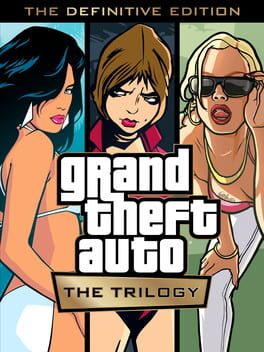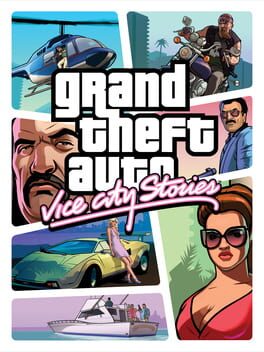Waikay
Bio
Nothing here!
Badges

Shreked
Found the secret ogre page

Gamer
Played 250+ games

Loved
Gained 100+ total review likes

Best Friends
Become mutual friends with at least 3 others

3 Years of Service
Being part of the Backloggd community for 3 years

Popular
Gained 15+ followers

Well Written
Gained 10+ likes on a single review

Noticed
Gained 3+ followers

Liked
Gained 10+ total review likes

N00b
Played 100+ games
257
Total Games Played
000
Played in 2024
000
Games Backloggd
Recently Reviewed See More
This write-up will consider only the base-game.
A game this good, a game this good so often talked about, a game this good in a nigh-extinct manner, cannot help but attract imprecise praise. By some, New Vegas is a refreshing turn away from the omni-simplistic Bethesda present to the morally, mechanically complex Interplay past. My most controversial take is as follows. This line of thinking dramatically underappreciates the skeleton of Fallout 3: the VATS, the shooting, the boneless physics, the ability to walk and crab-walk any direction in the Mojave. These qualities, continuing onwards from Fallout 3, contribute to the sense of freedom just as much as all the items in that now-familiar list, of "How Obsidian Showed Bethesda What's What": deeper companions, the factions, the endearing world, the threshold skill checks, that one Vault where the dwellers were forced to kill each other, being able to throw the loser NCR general off the Hoover Dam.
That sense of freedom to define the self and the world is why many fans regard New Vegas so highly. Over 3, 4, 76 for sure, but as those people will more cautiously insinuate, over the originals 1 and 2 as well. I am sympathetic. I like Obsidian and sometimes Bethesda. And to have their such genre-defining idiosyncrasies come together remains a mysteriously unsung miracle. But prior to the intervention of the DLCs, the true revelation of Avellone and Obsidian's narrative colors, many ways the true story of New Vegas and the grand conclusion to all of Fallout, New Vegas as is lacks a particular intensity, a particular focus.
Fallout 2 suffered much the same way. But consider some of its scenes in order. That game starts with the gunning down of the dwellers by the Enclave soldiers more power armor than people. We then endure an interminable procession of games forum in-jokes that remind us more of the annoying present than the fearsome future. But at is final moments we are ambushed. We see one of those power armor reveal its green flesh, fanatic voice, and broken mind: the infertile monster-cub of the wasteland reared in Old World prejudice, resistant to diplomacy that served you unfailingly for both games. And after this immovable beast is torn to shreds by the last hurrah of turrets and turn-based combat, its torso crawls towards you, much like the mutilated corpse of the overseer in the previous game tried to crawl back to his home, gunned down by your ancestor who had been betrayed by the very ones for whom he given it all. This irradiation of the soul, of Frank Horrigan, the United States, your characters, the world in the way, persists as a lingering image over your rescued tribe, over the possibility of renewal, right alongside some Monty Python reference. Even as some things change, other things - other things never change.
For the ingenuity of its parts, of both Obsidian and Bethesda make, I cannot place New Vegas behind Fallout 2. But that sense of soul and its ambiguous destiny are what is missing in the base game of New Vegas, and it is to me the surest sign of the rushed development cycle. The options are there on the grand scale: old democracy, old fascism, old despotism, maybe a new freedom. These people quote Hegel, conceal their frailties, forget their regrets, and push on to bring forth another unchanging instance of War. Smaller scale too: a widower soldier's rage, a mutant's memories, a scribe's vanishing place in the world, that one Vault we all praise for its experiments on mob mentality and individual weakness, Benny's sorry ass in the arena or on the cross. The Courier is a capable agent, doing this, doing that for this and that reason with this or that skill. But as his imprint grows in town, city, world, and history, what does that say on that final level beyond and within? One could argue Fallout 1 and 2 never 'said' anything in the end. But it certainly sounded like something. All that power to choose one's destiny coming up against loneliness, betrayal, schizoid uncertainty, and just a little handful of light and companionship and a still wasted world so undersized in the palm of a power armor suit. The problem is that New Vegas, in its base form, is not haunted. The rickety machine for all its charms still hasn't the ghost.
No wonder then, that the DLCs were so loud, so brazen in reversing the exorcism forced by their infamously troubled release schedule. For their own various faults, that line of add-ons truly added on, no less than the thickest fog of old world blues threatening to sadden the world, once with its absence and again with its rebirth. In the meantime, one marvels at the bloodless body. And to be sure, whatever spirit is to be returned must just as equally thank the skilled make of its vessel. The musculature, the sinews, the connective tissue, the way it moves and the places it goes, the way it handles itself and keenly observes, the way speaks and sneaks, the way it all but has proven the things it can do, the places it can go. And its fault I have laid out a tad harshly perhaps is no fault of its own, but circumstance. It was just shot in the head; it will get up, get out of this little town too small for its ambition. We will get to New Vegas soon.
A game this good, a game this good so often talked about, a game this good in a nigh-extinct manner, cannot help but attract imprecise praise. By some, New Vegas is a refreshing turn away from the omni-simplistic Bethesda present to the morally, mechanically complex Interplay past. My most controversial take is as follows. This line of thinking dramatically underappreciates the skeleton of Fallout 3: the VATS, the shooting, the boneless physics, the ability to walk and crab-walk any direction in the Mojave. These qualities, continuing onwards from Fallout 3, contribute to the sense of freedom just as much as all the items in that now-familiar list, of "How Obsidian Showed Bethesda What's What": deeper companions, the factions, the endearing world, the threshold skill checks, that one Vault where the dwellers were forced to kill each other, being able to throw the loser NCR general off the Hoover Dam.
That sense of freedom to define the self and the world is why many fans regard New Vegas so highly. Over 3, 4, 76 for sure, but as those people will more cautiously insinuate, over the originals 1 and 2 as well. I am sympathetic. I like Obsidian and sometimes Bethesda. And to have their such genre-defining idiosyncrasies come together remains a mysteriously unsung miracle. But prior to the intervention of the DLCs, the true revelation of Avellone and Obsidian's narrative colors, many ways the true story of New Vegas and the grand conclusion to all of Fallout, New Vegas as is lacks a particular intensity, a particular focus.
Fallout 2 suffered much the same way. But consider some of its scenes in order. That game starts with the gunning down of the dwellers by the Enclave soldiers more power armor than people. We then endure an interminable procession of games forum in-jokes that remind us more of the annoying present than the fearsome future. But at is final moments we are ambushed. We see one of those power armor reveal its green flesh, fanatic voice, and broken mind: the infertile monster-cub of the wasteland reared in Old World prejudice, resistant to diplomacy that served you unfailingly for both games. And after this immovable beast is torn to shreds by the last hurrah of turrets and turn-based combat, its torso crawls towards you, much like the mutilated corpse of the overseer in the previous game tried to crawl back to his home, gunned down by your ancestor who had been betrayed by the very ones for whom he given it all. This irradiation of the soul, of Frank Horrigan, the United States, your characters, the world in the way, persists as a lingering image over your rescued tribe, over the possibility of renewal, right alongside some Monty Python reference. Even as some things change, other things - other things never change.
For the ingenuity of its parts, of both Obsidian and Bethesda make, I cannot place New Vegas behind Fallout 2. But that sense of soul and its ambiguous destiny are what is missing in the base game of New Vegas, and it is to me the surest sign of the rushed development cycle. The options are there on the grand scale: old democracy, old fascism, old despotism, maybe a new freedom. These people quote Hegel, conceal their frailties, forget their regrets, and push on to bring forth another unchanging instance of War. Smaller scale too: a widower soldier's rage, a mutant's memories, a scribe's vanishing place in the world, that one Vault we all praise for its experiments on mob mentality and individual weakness, Benny's sorry ass in the arena or on the cross. The Courier is a capable agent, doing this, doing that for this and that reason with this or that skill. But as his imprint grows in town, city, world, and history, what does that say on that final level beyond and within? One could argue Fallout 1 and 2 never 'said' anything in the end. But it certainly sounded like something. All that power to choose one's destiny coming up against loneliness, betrayal, schizoid uncertainty, and just a little handful of light and companionship and a still wasted world so undersized in the palm of a power armor suit. The problem is that New Vegas, in its base form, is not haunted. The rickety machine for all its charms still hasn't the ghost.
No wonder then, that the DLCs were so loud, so brazen in reversing the exorcism forced by their infamously troubled release schedule. For their own various faults, that line of add-ons truly added on, no less than the thickest fog of old world blues threatening to sadden the world, once with its absence and again with its rebirth. In the meantime, one marvels at the bloodless body. And to be sure, whatever spirit is to be returned must just as equally thank the skilled make of its vessel. The musculature, the sinews, the connective tissue, the way it moves and the places it goes, the way it handles itself and keenly observes, the way speaks and sneaks, the way it all but has proven the things it can do, the places it can go. And its fault I have laid out a tad harshly perhaps is no fault of its own, but circumstance. It was just shot in the head; it will get up, get out of this little town too small for its ambition. We will get to New Vegas soon.
lmao
Almost as pointless as Liberty City Stories, but Victor Vance being someone who gets unceremoniously gunned down in the opening cinematic of Vice City actually imbues this game with a bizarre pathos. The last protagonist of the 3D era, Victor Vance is a transition between the amoral avatar Claude and "cinematic" character Niko Bellic. Niko himself could never overcome the contradiction between confessing his childhood on the battlefield and running over pedestrians with his stolen sedan on the way home, but Vic's eventual fate renders his wishy washy conscience into an interesting character flaw. Vic is pathetic, but not like Tony Cipriani, a self-unaware shmuck from start to finish. Vic feels one way, keeps going, loses what he needs, and is moderately satisfied by his material gains at the end. Then he gets murdered and is forgotten by the world. It may be the best Rockstar has gotten to an interesting idea embodied outside their tried and untrue methods.


